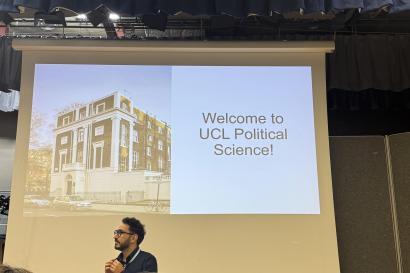Preparing to study abroad makes me feel like my own administrative assistant some days. Over the last eight months, I have written scholarship essays, filled out tons of forms, read so much program information, and called and emailed more people than I ever have before in my life (I’ve always hated phone calls). I board my plane in less than a week, so recently, my pre-departure to-do list has become extremely long. I’ve been googling things like phone plans, taking medication into the UK, absentee ballots, and using my credit and debit cards in the UK. It has felt overwhelming at times, especially since throughout this whole process I’ve also had school or work plus graduate school applications on my plate. But I know that this long journey will be worth it, and I believe all the details will eventually work out. As I finish my final preparations, I’d like to share with you a few of the major things I’ve done to prepare to study abroad and my best advice for dealing with them.
- Organization
My organizational approach has been to create a month-by-month list of tasks. One of the first things I did once I was accepted to my program was to read the pre-departure information and write down all foreseeable tasks on this list. It has helped me so much in making sure I’m on top of deadlines. I’ve started using Notion this year, especially for organization and planning, and I’ve been using it for my study abroad planning as well. I like it because I can have an Oxford heading and several pages linked underneath that are separate but still kept in one place (also you can choose super cool “cover” pictures from Unsplash in Notion for the top of each page – several of mine are of Oxford, as you can see). Here is a picture of my “Education” page in Notion. It really doesn’t matter where you write it down, but I would highly recommend keeping some kind of to-do list organized by date.

2. Applying to Scholarships
One of my top-priority tasks has been applying to scholarships. I applied to my first scholarships in December, and I finished my last application at the end of May. It’s been a long process, but as someone who won enough scholarships to fund my entire degree, I know investing time in applications can pay off in huge ways. I read Confessions of a Scholarship Winner by Kristina Ellis when applying to college, and I continue to use the methods found in the book to craft applications that fit what committees are looking for. Although it is geared toward general scholarship applications, it definitely applies to study abroad and has fantastic advice.
First I applied to scholarships through my college, both study abroad-specific scholarships and a non-study abroad departmental one. School scholarships are great because the pool of applicants is relatively small, so you have a fairly good chance of winning one. After talking to a financial aid advisor in the spring, I confirmed that a fair amount of the scholarships I already had at school could be used for study abroad, so that helped as well. I also applied to IES Abroad scholarships and one other that was specific to the UK, the Lord Acton Memorial Scholarship, which I found on IES Abroad’s website. Along the way I have experienced both the excitement of winning and the disappointment of being rejected, sometimes by an extremely narrow margin, but ultimately, I have been able to win enough scholarships to pay for the large majority of my costs.
3. Booking Flights
Booking my flight felt like a big moment. IES Abroad required me to have it done by the middle of June, and I ended up doing it at the end of May. I used both Google Flights and a Capital One Travel alert to track prices on the flight during the spring. Google Flights will send you emails when prices change, but the Capital One alert also told me when prices were likely to drop lower, so that was helpful. When I set the alerts, I made sure to set the arrival time filter early enough to meet IES Abroad’s requirements; my flight had to arrive before 11am so I could be on time for housing orientation.
I’m not sure if I’ll have a lot of time to travel while at Oxford, depending on my workload, so I want to have the option to visit a few places in Europe after the program ends. I chose to book my return ticket for a little less than a week after my program ends to allow me time to travel, and I chose the ticket option that allowed me to reschedule my return flight if I needed to. Before buying my ticket, I researched companies in London that store luggage so I will have somewhere to store my large suitcase for a week while I travel.
4. Waiting
Waiting for further information has been one of the more stressful parts of this process. It took a while to find out what tutorials I would take at Oxford, and while I was waiting, I had a form to submit to my university concerning getting credit for those courses. My school requires some sort of syllabus to confirm ahead of time that study abroad courses will transfer for credit, and I had nothing of the sort and couldn’t find anything online either. I had heard that Oxford tutorial topics can be personalized according to the student’s interests, and although I figured math probably wasn’t as open-ended as other disciplines, I wondered if I would ever receive an official syllabus. My school told me that if I didn’t have syllabi, I might have to wait until I started the term at Oxford, or even until I finished it, to confirm what the tutorials would transfer as. That stressed me out a lot - I’m a senior, which already means I have had to watch credit transfer and transcript details carefully. I wanted to know what the courses would count for before I took them. Thankfully, at the beginning of May, I was told what tutorials I would be taking (although I also had to pick a third one - apparently math students take three), and I also received links to information that was pretty much syllabi, so my courses were all approved to transfer. Throughout the predeparture process, there have been numerous times when, although I was anxious for an issue to be resolved immediately, with time and patience, everything ended up working out.
As I’m sure you can tell, studying abroad is a substantial undertaking with many deadlines to meet. But if you read the information IES Abroad provides, do a little research, and make a list of tasks and check it fairly regularly, you’ll be able to manage the preparation phase of studying abroad and be on your way to an amazing adventure.

Emma Stuck
Hi! My name is Emma and I’m a nerd. I’m an aspiring mathematician, but I also play the piano, sing in choirs, and love reading and writing. I follow Jesus and I enjoy taking walks, organizing, and visiting scenic spots, from mountains to cities.






